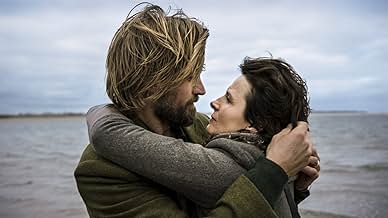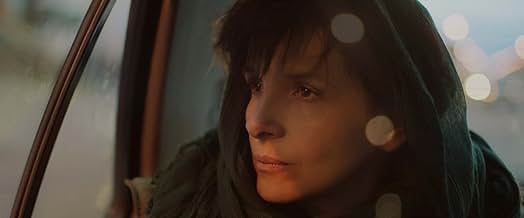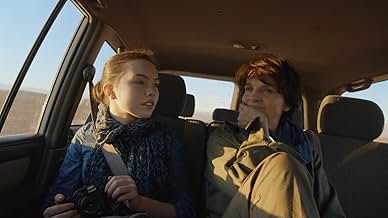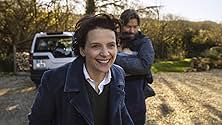CALIFICACIÓN DE IMDb
7.0/10
8.3 k
TU CALIFICACIÓN
Agrega una trama en tu idiomaRebecca is one of the world's top war photographers. She must weather a major emotional storm when her husband refuses to put up with her dangerous life any longer.Rebecca is one of the world's top war photographers. She must weather a major emotional storm when her husband refuses to put up with her dangerous life any longer.Rebecca is one of the world's top war photographers. She must weather a major emotional storm when her husband refuses to put up with her dangerous life any longer.
- Dirección
- Guionistas
- Elenco
- Premios
- 6 premios ganados y 14 nominaciones en total
Zoubida Akif
- Ariana
- (as Zoubida Afik)
Opiniones destacadas
Juliette Binoche is one of the finest actresses of the past few decades. None of her beauty and vividness have faded with the advancing years. She brings to this role, as with all of her other roles a lot of heartfelt emotion. She plays a war photographer who is at war with herself about her family responsibilities versus her commitment to her dangerous occupation.
Nicolas Costas Waldau is brilliant as her husband. A much more appealing character than his Game of Thrones one. The young actresses who play her daughters are also wonderful.
One thing I will say is that it's frustrating to watch her put herself in immediate danger. Especially seeing as she has such an idyllic home life with such a beautiful husband, children and a nice cottage in rural Ireland. I won't spoil it for you. It is a wonderful movie, if a little frustrating.
Nicolas Costas Waldau is brilliant as her husband. A much more appealing character than his Game of Thrones one. The young actresses who play her daughters are also wonderful.
One thing I will say is that it's frustrating to watch her put herself in immediate danger. Especially seeing as she has such an idyllic home life with such a beautiful husband, children and a nice cottage in rural Ireland. I won't spoil it for you. It is a wonderful movie, if a little frustrating.
Griping drama about a war photographer who is caught between choosing her family or her work. Which we learn is a lot more complicated than we initially thought. The cast did a believable portrayal of the difficulties that people encounter in life between their passion and family. What I liked especially about this film was that the lead was not portrayed as some war hero and her story was not romanticized. The story and characters all felt realistic and convincing since the characters were different shades of gray. Something that is amiss these days within film making. There is always a need to create a struggle between good and evil. Probably one of the better stories I have seen this year. Erik Poppe you did a great job with this one!
7OJT
This is Norwegian director Erik Poppe's fourth feature film, and a film which many have had high expectations too. I must say this is a good film, but far from his best. I simply loved "Hawaii, Oslo" and "Troubled waters" which both was pretty much perfect film experiences. The debut film "Schpaa" was also very promising.
The script here is written by Norwegian author and screenwriter Harald Rosenløw Eeg, after a story by Erik Popp which is largely inspired by personal experiences as a war photographer.
We meet the great war photographer Rebecca (Juliette Binoche), living in Ireland, when she's home, that is. Because her relationship with her family is faltering due to her dangerous work, and many days away from home. She follows suicide bombers in Kabul, and rampage killers in Africa. Her husband is a marine biologist (Nicolai Coaster-Waldau), and he is very tired of her not being there, even when she's home. This is also affecting their two daughters.
Make no mistake. This is a good film, but I felt it lacked some tempo. The slow thinking pace may be correct to get the feeling, but the film loses momentum, and could easily be a disappointment for those expecting another Poppe masterpiece. Because this isn't. Well, it's an interesting theme, but what could have been a great drama is slipping away. It's not the actor's fault, because they are doing a great job.
The film is artistically beautiful, and the opening is really something which makes you speculate. I must admit I was a bit disappointed, since I reckon Poppe as the best Norwegian director ever. But this wasn't wholly fulfilling to me.
This won the Special Grand Prize of the jury at the 37th Montréal Film Festival 2013.
The script here is written by Norwegian author and screenwriter Harald Rosenløw Eeg, after a story by Erik Popp which is largely inspired by personal experiences as a war photographer.
We meet the great war photographer Rebecca (Juliette Binoche), living in Ireland, when she's home, that is. Because her relationship with her family is faltering due to her dangerous work, and many days away from home. She follows suicide bombers in Kabul, and rampage killers in Africa. Her husband is a marine biologist (Nicolai Coaster-Waldau), and he is very tired of her not being there, even when she's home. This is also affecting their two daughters.
Make no mistake. This is a good film, but I felt it lacked some tempo. The slow thinking pace may be correct to get the feeling, but the film loses momentum, and could easily be a disappointment for those expecting another Poppe masterpiece. Because this isn't. Well, it's an interesting theme, but what could have been a great drama is slipping away. It's not the actor's fault, because they are doing a great job.
The film is artistically beautiful, and the opening is really something which makes you speculate. I must admit I was a bit disappointed, since I reckon Poppe as the best Norwegian director ever. But this wasn't wholly fulfilling to me.
This won the Special Grand Prize of the jury at the 37th Montréal Film Festival 2013.
War photographer Rebecca (Juliette Binoche) is one of the best at her job, obtaining the kind of pictures that invariably get published in western magazines as examples of the violence of conflicts in nonwestern areas such as Afghanistan or Kenya. The only snag is that Rebecca is so obsessed with her work that she cannot understand the damage she is doing to her family back in Ireland, especially her daughter Steph (Lauryn Canny).
The conflict between personal and professional values forms the kernel of Erik Poppe's film. Yet thematically speaking the director is far more interested in prompting reflection on the photographer's trade. While Rebecca certainly shows a good deal of bravery in trying to get the best pictures, we also understand that she is something of a voyeur who actively enjoys intruding into her subjects' personal space. Her fondness for the close-up of suffering people is quite disconcerting, especially in a sequence taking place in the back of an SUV in Afghanistan. In political terms, she adopts a neocolonialist position of the westerner taking scopophilic pleasure in the power she exerts through her camera.
Perhaps the film's most telling moment occurs back in Ireland, when Steph turns the camera on Rebecca and photographs her repeatedly. Rebecca cannot endure the experience of the lens pointing at her in such an intense manner and turns her head away, her eyes filling with tears. Would that Rebecca might understand that her subjects could feel much the same; but if she did so, then she would not be good at her job.
Given the integrity with which Poppe examines this issue, it's rather sad that the film as a whole should be somewhat melodramatic. In the end the action descends into something of a tug-of-love battle between mother and family; at one point Rebecca bundles Steph and her younger sister Lisa (Adrianna Cramer Curtis) in a pathetic attempt to abduct them from their family home. Needless to say husband Marcus (Nikolaj Coaster-Waldau) foils the plot and eventually looks after the girls himself.
The film makes a half-hearted attempt to draw a parallel between Rebecca's wanderlust and the rhythms of the tide (her daughter observes that the photographer is like the sea, coming and going), but unfortunately outstays its welcome: the last half-hour unfolds slowly but predictably towards an inevitable denouement. This is a shame, given the seriousness of its basic premise - almost as if director Poppe had lost the courage of his convictions.
The conflict between personal and professional values forms the kernel of Erik Poppe's film. Yet thematically speaking the director is far more interested in prompting reflection on the photographer's trade. While Rebecca certainly shows a good deal of bravery in trying to get the best pictures, we also understand that she is something of a voyeur who actively enjoys intruding into her subjects' personal space. Her fondness for the close-up of suffering people is quite disconcerting, especially in a sequence taking place in the back of an SUV in Afghanistan. In political terms, she adopts a neocolonialist position of the westerner taking scopophilic pleasure in the power she exerts through her camera.
Perhaps the film's most telling moment occurs back in Ireland, when Steph turns the camera on Rebecca and photographs her repeatedly. Rebecca cannot endure the experience of the lens pointing at her in such an intense manner and turns her head away, her eyes filling with tears. Would that Rebecca might understand that her subjects could feel much the same; but if she did so, then she would not be good at her job.
Given the integrity with which Poppe examines this issue, it's rather sad that the film as a whole should be somewhat melodramatic. In the end the action descends into something of a tug-of-love battle between mother and family; at one point Rebecca bundles Steph and her younger sister Lisa (Adrianna Cramer Curtis) in a pathetic attempt to abduct them from their family home. Needless to say husband Marcus (Nikolaj Coaster-Waldau) foils the plot and eventually looks after the girls himself.
The film makes a half-hearted attempt to draw a parallel between Rebecca's wanderlust and the rhythms of the tide (her daughter observes that the photographer is like the sea, coming and going), but unfortunately outstays its welcome: the last half-hour unfolds slowly but predictably towards an inevitable denouement. This is a shame, given the seriousness of its basic premise - almost as if director Poppe had lost the courage of his convictions.
I came into the movies with an open mind, without any knowledge of either the plot, setting or premise of the movie. The opening left me mesmerized, starting off with a silent photographer documenting a ceremonial initiation of a suicide bomber, to later become hurt in the subsequent IED attack. The following complications and insight to the photographer's life really builds up a powerful and emotional drama that mostly plays out within the borders of her own home.
From the reaction of her husband to their children's acceptance of their mother's dangerous occupation, every scene feels truly genuine. In addition to being a perfectly acted and directed movie, the cinematography is, to say the least, absolutely astonishing and beautiful. From start to end, the movie feels like a beautiful painting, with no expense spared on the details.
The most refreshing feature of this particular movie is the way the story is delivered, in a non-predictable fashion freed from the basic "Hollywood-recipe". To say the least, this is by far one of the best European movie released in years, and I am yet to see a movie this original, captivating, refreshing and complex from Hollywood. 10/10 stars, absolutely a must-see for all movie enthusiasts that appreciate something else than recycled, brain-dead black and white portraits of reality that Hollywood keeps producing.
From the reaction of her husband to their children's acceptance of their mother's dangerous occupation, every scene feels truly genuine. In addition to being a perfectly acted and directed movie, the cinematography is, to say the least, absolutely astonishing and beautiful. From start to end, the movie feels like a beautiful painting, with no expense spared on the details.
The most refreshing feature of this particular movie is the way the story is delivered, in a non-predictable fashion freed from the basic "Hollywood-recipe". To say the least, this is by far one of the best European movie released in years, and I am yet to see a movie this original, captivating, refreshing and complex from Hollywood. 10/10 stars, absolutely a must-see for all movie enthusiasts that appreciate something else than recycled, brain-dead black and white portraits of reality that Hollywood keeps producing.
¿Sabías que…?
- Trivia"A thousand time goodnight" is a line from William Shakespeare's Romeo and Juliet.
- ErroresWhen Rebecca and Marcus are walking hand in hand on the beach after drinking wine with his colleagues, the second shot is a frontal medium shot. In the upper left part of the shot, the sound operator's boom microphone is briefly, but clearly visible.
Selecciones populares
Inicia sesión para calificar y agrega a la lista de videos para obtener recomendaciones personalizadas
- How long is 1,000 Times Good Night?Con tecnología de Alexa
Detalles
- Fecha de lanzamiento
- Países de origen
- Sitios oficiales
- Idiomas
- También se conoce como
- 1,000 Times Good Night
- Locaciones de filmación
- Productoras
- Ver más créditos de la compañía en IMDbPro
Taquilla
- Presupuesto
- EUR 5,284,200 (estimado)
- Total en EE. UU. y Canadá
- USD 53,895
- Fin de semana de estreno en EE. UU. y Canadá
- USD 24,120
- 26 oct 2014
- Total a nivel mundial
- USD 2,549,568
- Tiempo de ejecución1 hora 57 minutos
- Color
- Mezcla de sonido
- Relación de aspecto
- 2.35 : 1
Contribuir a esta página
Sugiere una edición o agrega el contenido que falta

Principales brechas de datos
By what name was Mil veces buenas noches (2013) officially released in India in English?
Responda
















